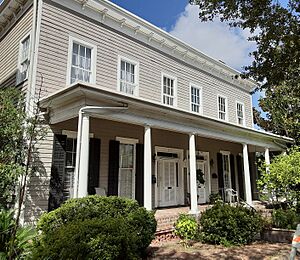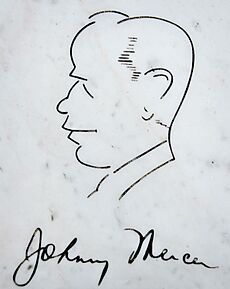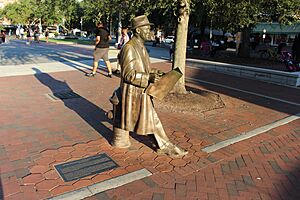Johnny Mercer facts for kids
Quick facts for kids
Johnny Mercer
|
|
|---|---|
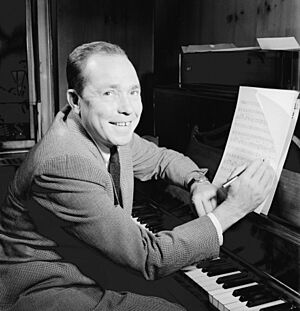
Mercer c. 1947
|
|
| Background information | |
| Birth name | John Herndon Mercer |
| Born | November 18, 1909 Savannah, Georgia, U.S. |
| Died | June 25, 1976 (aged 66) Hollywood, California, U.S. |
| Occupation(s) |
|
| Years active | 1930–1976 |
| Associated acts |
|
John Herndon Mercer (born November 18, 1909 – died June 25, 1976) was a famous American songwriter, lyricist, and singer. He also helped start Capitol Records, a well-known music company, with Buddy DeSylva and Glenn E. Wallichs.
Mercer is best known for writing the words (lyrics) to many popular songs. He also wrote music and was a popular singer himself. His songs were big hits from the 1930s to the 1950s. Some of his most famous songs include "Moon River", "Days of Wine and Roses", and "Autumn Leaves".
He wrote lyrics for over 1,500 songs, including many for movies and Broadway shows. Johnny Mercer was nominated for an Oscar nineteen times and won four Best Original Song Oscars.
Contents
Early Life and Musical Beginnings
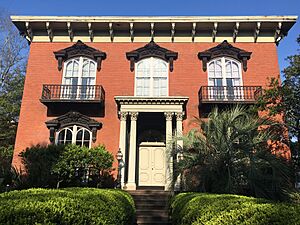
Johnny Mercer was born in Savannah, Georgia. When he was 10, one of his first jobs was sweeping floors at Leopold's Ice Cream. His father, George Anderson Mercer, was a lawyer and real estate developer. His mother, Lillian Elizabeth, loved to sing sentimental songs. Johnny believed he got his musical talent from her.
As a young child, Mercer loved music. His aunt said he was humming tunes when he was only six months old! She took him to shows where he heard different kinds of music like ragtime. His family's summer home by the water also inspired him.
Mercer heard a lot of different music growing up. He listened to African-American fishermen and vendors who spoke and sang in the Gullah language. He also enjoyed listening to Black church services. Mercer once said, "Songs always fascinated me more than anything." He didn't have formal music lessons. But by age six, he was singing in a choir. By 11 or 12, he knew almost all the songs he had heard.
Even though he loved music, Johnny Mercer was better at writing words and singing than playing instruments. He tried playing the trumpet and piano but didn't do well. He couldn't easily read music notes. Instead, he used his own way of writing down music. As a teenager, he loved jazz music. He listened to artists like Ma Rainey, Bessie Smith, and Louis Armstrong.
Mercer went to Woodberry Forest School in Virginia until 1927. He wasn't the best student, but he enjoyed literary and poetry clubs. He also wrote funny stories for school papers. This helped him learn many new words and phrases. He started writing down clever rhymes to use later. Mercer was also known as the class clown. He helped book music acts for school events.
At a young age, Mercer was already good at jazz. His yearbook said that no band was "good" until Johnny approved it. He started writing his own songs, like "Sister Susie, Strut Your Stuff." His family hoped he would go to Princeton University. But his father's money problems stopped that plan. Johnny then worked for his father's business. But he soon got bored with it.
Starting His Career
In 1928, when he was 19, Mercer moved to New York City. This was a great time for music, with jazz and blues booming. Broadway was full of musicals by famous composers like George Gershwin and Irving Berlin.
Mercer's first jobs were small acting roles. He lived in a small apartment and started singing and writing lyrics again. He worked at a brokerage house during the day and sang at night. One night, he met famous entertainer Eddie Cantor. Cantor encouraged Mercer's music career.
Mercer's first song lyric, "Out of Breath (and Scared to Death of You)" (1930), was in a musical show. At this show, he met his future wife, Ginger Meehan, who was a chorus girl. His first song was published and recorded by Joe Venuti and his New Yorkers.
Mercer began spending time with other songwriters. He learned a lot about the music business. He traveled to California for a lyric writing job. There, he met his idols Bing Crosby and Louis Armstrong. He realized he preferred writing lyrics for stand-alone songs rather than for musicals.
He got a job as a staff lyricist for Miller Music. This gave him a steady income. He married Ginger in 1931. In 1932, Mercer won a contest to sing with the Paul Whiteman orchestra. He also learned a lot from working with Yip Harburg on the show Americana.
Mercer's career really took off when he met Hoagy Carmichael. Carmichael was already famous for his song "Stardust". Mercer spent a year writing the lyrics for their song "Lazybones." It became a hit just one week after it was first played on the radio. Mercer became a member of ASCAP, a group for songwriters. He received congratulations from famous songwriters like Irving Berlin and George Gershwin.
In the 1930s, songs started to be used more in movies and stage musicals to help tell the story. This meant there was less demand for stand-alone songs. So, Mercer decided to move to Hollywood. He took a job writing songs and performing in movies for RKO.
Hollywood Success
Mercer moved to Hollywood in 1935. He started writing music for films. His first big Hollywood song was "I'm an Old Cowhand from the Rio Grande." He wrote both the music and the lyrics for this song. Bing Crosby sang it in the 1936 film Rhythm on the Range. After this, everyone wanted Mercer to write lyrics.
In 1937, Mercer started working for Warner Bros.. He worked with composer Richard A. Whiting and wrote "Too Marvelous for Words" and "Hooray for Hollywood." After Whiting passed away, Mercer worked with Harry Warren. They wrote "Jeepers Creepers," which earned Mercer his first Oscar nomination. Other hits with Warren included "You Must Have Been a Beautiful Baby."
Mercer also started singing again. He performed duets with Bing Crosby. Two of their songs, "Mr. Gallagher and Mr. Shean" and "Mister Meadowlark," became hits. In 1939, Mercer wrote the lyrics for "And the Angels Sing." This song became a major hit for Benny Goodman's band. The title is even on Mercer's tombstone today.
Mercer worked with Harold Arlen, who wrote jazz and blues-inspired music. Their first hit was "Blues in the Night" (1941). They also wrote "One for My Baby (and One More for the Road)" (1941), "Ac-Cent-Tchu-Ate the Positive" (1944), "That Old Black Magic" (1942), and "Come Rain or Come Shine" (1946).
"Come Rain or Come Shine" was Mercer's only Broadway hit. He won his first Academy Award for Best Song for "On the Atchison, Topeka and the Santa Fe" in 1946. He also reunited with Hoagy Carmichael for the Oscar-winning "In the Cool, Cool, Cool of the Evening" (1951).
Founding Capitol Records
In 1942, Johnny Mercer helped start Capitol Records in Hollywood. He worked with producer Buddy DeSylva and record store owner Glen Wallichs. As a leader at Capitol, he signed many important artists, including Nat "King" Cole. Capitol Records also gave Mercer a place to record his own songs. His song "Strip Polka" was one of the first songs released by the company.
Mercer's four million-selling songs were "Ac-Cent-Tchu-Ate the Positive," "On the Atchison, Topeka, and the Santa Fe," "Candy," and "Personality." His recording of "Zip-a-Dee-Doo-Dah" from Disney's Song of the South was a top hit for eight weeks.
By the mid-1940s, Mercer was known as one of Hollywood's best lyricists. He was good at listening to a tune and then writing words that fit its style. He loved using many words, including puns, and current slang. He also used sound effects in his songs, like train whistles in "Blues in the Night."
Mercer often preferred to have the music first. He would take the tune home and work on the lyrics. He also wrote new lyrics for popular songs that already existed. Famous examples include "Laura" and "Autumn Leaves."
Radio Programs
In 1943, Mercer had his own radio show called Johnny Mercer's Music Shop. He was the star, and singers Ella Mae Morse and Jo Stafford were regular guests. He also had a similar show called The Chesterfield Music Shop in 1944.
Later Career and Legacy
In the 1950s, rock and roll music became popular. This changed the music scene and affected Mercer's style of songs. He wrote for several MGM films, like Seven Brides for Seven Brothers (1954). He also worked on three Broadway musicals.
His successful songs in the 1950s include "The Glow-Worm" and "Something's Gotta Give." In 1961, he wrote the lyrics for "Moon River" for the movie Breakfast at Tiffany's. He also wrote "Days of Wine and Roses" for the movie of the same name. Both songs had music by Henry Mancini. Mercer won his third and fourth Oscars for these two songs. This was the first time a songwriting team won back-to-back Oscars.
Mercer also wrote "Charade" (1963) with Mancini. He wrote "I Wanna Be Around" (1962), a classic for Tony Bennett, and "Summer Wind" (1965), a hit for Frank Sinatra.
In 1964, Ella Fitzgerald released an album called Ella Fitzgerald Sings the Johnny Mercer Song Book. This showed how highly people thought of Mercer's work.
In 1969, Mercer helped create the National Academy of Popular Music's Songwriters Hall of Fame. In 1974, he recorded two albums of his songs in London.
Late in his life, Mercer became friends with pianist Emma Kelly. He called her "The Lady of Six-Thousand Songs" because she knew so many songs by heart.
After His Death
After Mercer passed away, his wife, Ginger, gave some of his unfinished lyrics to singer Barry Manilow. Manilow wrote music for one of these lyrics, called "When October Goes." It became a popular song in 1984. Many other artists have recorded it since then.
Singing Style
Johnny Mercer was also a well-liked singer. He had a friendly, folksy voice. He was especially good at singing his own songs, like "Ac-Cent-Tchu-Ate the Positive" and "Lazybones." People thought he was a great performer of his own work.
In 1961, he released a duet album called Two of a Kind with Bobby Darin.
Personal Life
In 1931, Mercer married Ginger Meltzer. In 1940, they adopted a daughter named Amanda, who they called Mandy. Mandy later married Bob Corwin, who was a pianist for famous singers and also Mercer's long-time accompanist. They had a son, Jim, in 1961.
Johnny Mercer passed away on June 25, 1976, at age 66, from a brain tumor. He was buried in Bonaventure Cemetery in Savannah, Georgia.
Awards and Honors
Academy Awards
Johnny Mercer won four Academy Awards for Best Original Song:
- 1946: "On the Atchison, Topeka and the Santa Fe" (music by Harry Warren) for The Harvey Girls
- 1951: "In the Cool, Cool, Cool of the Evening" (music by Hoagy Carmichael) for Here Comes the Groom
- 1961: "Moon River" (music by Henry Mancini) for Breakfast at Tiffany's
- 1962: "Days of Wine and Roses" (music by Henry Mancini) for Days of Wine and Roses
Other Honors
In 1980, the Songwriters Hall of Fame created the Johnny Mercer Award. This is their highest honor for songwriters who have created amazing works.
In 1996, the United States Postal Service honored Mercer with his picture on a postage stamp. His star on the Hollywood Walk of Fame is near the Capitol Records building.
In 1994, Johnny Mercer was mentioned in the famous book Midnight in the Garden of Good and Evil. The movie made from the book in 1997 featured many of Mercer's songs.
For Mercer's 100th birthday in 2009, Clint Eastwood made a documentary film about his life called The Dream's on Me. The film was nominated for an Emmy Award.
The Complete Lyrics of Johnny Mercer was published in 2009. It contains almost 1,500 of his lyrics. Also in 2009, a bronze statue of Mercer was put up in Ellis Square in Savannah, his hometown.
His papers and belongings are kept at Georgia State University in Atlanta.
In 2015, Mercer's song "Ac-Cent-Tchu-Ate the Positive" was added to the Library of Congress's National Recording Registry. This means it's important for American culture and history. Mercer said he got the idea for the song's lyrics from a sermon that said, "you got to accentuate the positive and eliminate the negative."
Famous Songs Written by Johnny Mercer
| Year | Song Title | Music by | Notes |
|---|---|---|---|
| 1933 | "Lazy Bones" | Hoagy Carmichael | |
| 1936 | "Goody Goody" | Matty Malneck | |
| 1936 | "I'm an Old Cowhand from the Rio Grande" | Johnny Mercer | |
| 1937 | "Hooray for Hollywood" | Richard A. Whiting | |
| 1937 | "Too Marvelous for Words" | Richard A. Whiting | |
| 1938 | "Jeepers, Creepers!" | Harry Warren | Featured in the film Going Places |
| 1938 | "You Must Have Been a Beautiful Baby" | Harry Warren | |
| 1939 | "And the Angels Sing" | Ziggy Elman | |
| 1939 | "Day In, Day Out" | Rube Bloom | |
| 1940 | "Fools Rush In" | Rube Bloom | |
| 1941 | "Blues in the Night" | Harold Arlen | Featured in the film Blues in the Night |
| 1941 | "I Remember You" | Victor Schertzinger | |
| 1941 | "Tangerine" | Victor Schertzinger | |
| 1942 | "Dearly Beloved" | Jerome Kern | Featured in the film You Were Never Lovelier |
| 1942 | "I'm Old Fashioned" | Jerome Kern | |
| 1942 | "Skylark" | Hoagy Carmichael | |
| 1942 | "That Old Black Magic" | Harold Arlen | Featured in the film Star Spangled Rhythm |
| 1943 | "Dream" | Johnny Mercer | |
| 1943 | "One for My Baby (and One More for the Road)" | Harold Arlen | |
| 1944 | "Ac-Cent-Tchu-Ate the Positive" | Harold Arlen | Featured in the film Here Come the Waves |
| 1945 | "Laura" | David Raksin | |
| 1946 | "Come Rain or Come Shine" | Harold Arlen | |
| 1946 | "On the Atchison, Topeka and the Santa Fe" | Harry Warren | Won an Oscar for the film The Harvey Girls |
| 1947 | "Autumn Leaves" | Joseph Kosma | Based on a French song |
| 1951 | "In the Cool, Cool, Cool of the Evening" | Hoagy Carmichael | Won an Oscar for the film Here Comes the Groom |
| 1953 | "Satin Doll" | Duke Ellington, Billy Strayhorn | |
| 1955 | "Something's Gotta Give" | Johnny Mercer | Featured in the film Daddy Long Legs |
| 1961 | "Moon River" | Henry Mancini | Won an Oscar for the film Breakfast at Tiffany's |
| 1962 | "Days of Wine and Roses" | Henry Mancini | Won an Oscar for the film Days of Wine and Roses |
| 1963 | "Charade" | Henry Mancini | Featured in the film Charade |
| 1965 | "Summer Wind" | Henry Mayer | |
| 1973 | "The Phony King of England" | Johnny Mercer | Featured in the Disney film Robin Hood |
Discography (Albums by Johnny Mercer)
- Johnny Mercer Sings (Capitol, 1950)
- Two of a Kind with Bobby Darin (Atco, 1961)
- Johnny Mercer with Paul Weston's Orchestra 1944 (Hindsight, 1980)
- Sweet Georgia Brown with Paul Weston (Hindsight, 1995)
- Johnny Mercer Sings Personality (ASV-Living Era, 2002)
- Johnny Mercer: Mosaic Select #28 (Mosaic, 2007)
- Mercer Sings Mercer (Capitol, 2009)
See also
 In Spanish: Johnny Mercer para niños
In Spanish: Johnny Mercer para niños
 | Shirley Ann Jackson |
 | Garett Morgan |
 | J. Ernest Wilkins Jr. |
 | Elijah McCoy |


